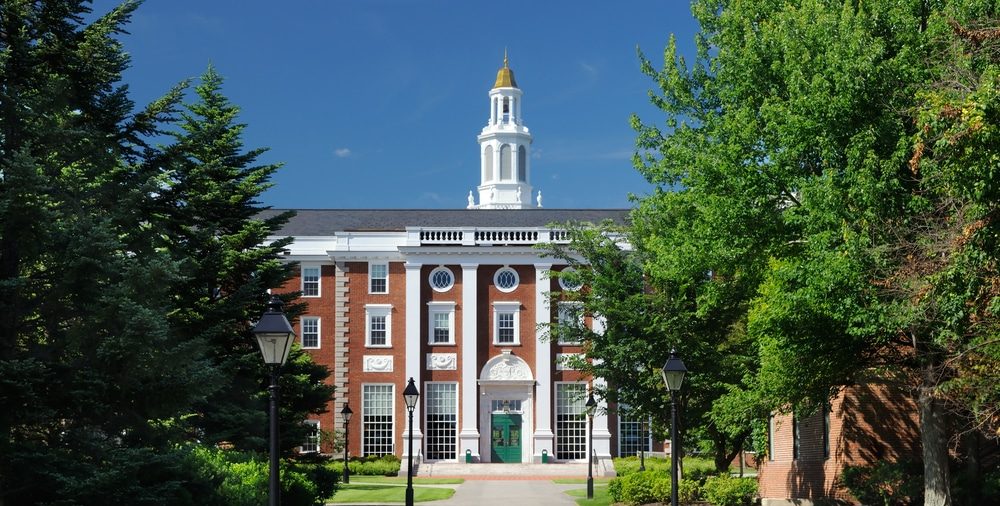Understanding the Requirements for Biology Majors at Harvard
If you have dreams of becoming a biology major at Harvard University, you may be curious about the specific requirements and coursework involved. Studying biology at Harvard is rigorous and comprehensive, providing students with a solid foundation in the field. From core courses to laboratory requirements and elective options, this article will guide you through the ins and outs of the biology track at Harvard.
Understanding Harvard’s Biology Program
The Importance of Biology at Harvard
Harvard University has long been known for its excellence in the sciences, and the biology department is no exception. With a rich history and a faculty of renowned experts in various subfields of biology, Harvard offers students a unique and immersive learning experience. The biology major at Harvard is designed to equip students with a deep understanding of biological principles, critical thinking skills, and hands-on laboratory experience.

Studying biology at Harvard provides students with unparalleled opportunities for research and collaboration. The university’s extensive resources, state-of-the-art facilities, and cutting-edge technology enable students to engage in groundbreaking research projects. Whether studying the intricacies of molecular biology or exploring the wonders of ecosystems, Harvard’s biology major offers a diverse and dynamic environment for scientific exploration.
Overview of the Biology Program
The biology program at Harvard consists of a well-rounded curriculum encompassing various topics within the field. Students are exposed to both theoretical and practical aspects of biology, allowing them to comprehensively understand the subject. The program is structured to ensure that students gain expertise in fundamental areas of biology while providing flexibility for specialization in specific areas of interest.
At Harvard, biology majors can take courses in various subfields, including genetics, cell biology, ecology, and evolutionary biology. These courses are taught by world-class faculty members at the forefront of their respective fields. Students also have the option to participate in research projects, internships, and fieldwork, further enhancing their understanding of biology and its real-world applications.
In addition to coursework, biology at Harvard emphasizes the development of critical thinking and analytical skills. Students are encouraged to think independently, ask probing questions, and approach problems from multiple perspectives. Through rigorous coursework and hands-on experiences, students learn to analyze data, conduct experiments, and draw evidence-based conclusions.
Furthermore, the biology program at Harvard strongly emphasizes laboratory experience. Students have access to state-of-the-art laboratories equipped with advanced instruments and technologies. Under the guidance of experienced faculty members, students learn essential laboratory techniques, conduct experiments, and analyze data. This hands-on experience enhances their understanding of biological concepts and prepares them for future research endeavors or careers in the field.
Core Course Requirements for Biology Majors
Required Introductory Courses
As a biology major at Harvard, you will begin your journey with a series of foundational courses. These courses lay the groundwork for further exploration and provide a solid understanding of the essentials of biology. Some required introductory courses may include General Biology, Molecular and Cellular Biology, and Chemical and Physical Biology. These courses are designed to provide a broad overview of the field and introduce students to key concepts and theories.
General Biology is an introductory course that covers the fundamental principles of biology. Through lectures, laboratory work, and interactive discussions, students will explore topics such as cell structure and function, genetics, and the diversity of life. This course serves as a gateway to the world of biology, setting the stage for more specialized studies.

Molecular and Cellular Biology focuses on the inner workings of cells and the molecules that drive biological processes. Students will delve into topics such as DNA replication, protein synthesis, and cellular signaling. Through hands-on experiments and cutting-edge research, students will gain a deeper understanding of the intricate mechanisms that govern life at the molecular level.
Chemical and Physical Biology offers students a comprehensive understanding of the physical and biological sciences. This focus is tailored for students eager to use numerical methods, physical theories, and chemical fundamentals in their exploration of biology.
Advanced Coursework in Biology
Once you have completed the required introductory courses, you will have the opportunity to delve deeper into various areas of biology through advanced coursework. These courses are more specialized and allow you to explore topics such as Genetics, Ecology, and Physiology in greater detail. The advanced coursework is designed to challenge and stimulate your intellectual curiosity while providing you with the necessary knowledge and skills to pursue further study or a career in biology.
Genetics is a fascinating field that explores the inheritance and variation of traits in living organisms. In this advanced course, students will study the structure and function of genes and the mechanisms of genetic inheritance. Students will gain practical genetic analysis and manipulation skills through laboratory experiments and data analysis.
Ecology is the study of how organisms interact with each other and their environment. In this advanced course, students will explore topics such as population dynamics, community ecology, and ecosystem functioning. Through fieldwork and data collection, students will gain a deep appreciation for the complexity and interconnectedness of natural systems.
Physiology focuses on the functions and mechanisms of living organisms. Students will study topics such as organ systems, homeostasis, and physiological adaptations. Through hands-on experiments and case studies, students will understand how organisms maintain their internal balance and respond to environmental challenges.
These advanced courses provide an opportunity for students to specialize in their areas of interest within biology. Whether you are passionate about genetics, ecology, or physiology, these courses will equip you with the knowledge and skills to pursue further research or a career in your chosen field.
Laboratory and Research Requirements
Mandatory Lab Courses
Biology is a field that requires hands-on experience and laboratory skills. The program includes mandatory laboratory courses to ensure that biology majors at Harvard are well-prepared for future scientific endeavors. These courses allow students to develop essential laboratory techniques, conduct experiments, and analyze data. The laboratory component of the biology major program fosters critical thinking, problem-solving, and teamwork skills.

During these mandatory lab courses, students have the chance to work with cutting-edge equipment and technology. They learn how to handle microscopes, centrifuges, and spectrophotometers, among other tools commonly used in biological research. Through hands-on experiments, students deeply understand fundamental biological concepts and learn how to apply them in real-world scenarios.
Furthermore, the laboratory courses incorporate a variety of experimental techniques, ranging from DNA extraction and gel electrophoresis to cell culture and protein purification. Students learn to design experiments, collect and analyze data, and draw meaningful conclusions. These skills are essential for future research endeavors and provide a solid foundation for a career in biology.
Opportunities for Independent Research
For those biology majors who wish to engage in independent research, Harvard provides numerous opportunities to do so. The university boasts state-of-the-art research facilities and offers undergraduate research programs where students can work closely with faculty on cutting-edge projects. Engaging in independent research allows biology majors to make meaningful contributions to the field and gain hands-on experience in their areas of interest.
Through independent research, students have the chance to delve deeper into specific topics of their choice. They can explore their own research questions, design experiments, and analyze data under the guidance of experienced faculty members. This hands-on experience enhances their understanding of biology and develops their critical thinking and problem-solving skills.
Harvard’s research programs provide biology majors access to state-of-the-art equipment and resources. Whether conducting genetic studies, investigating ecological systems, or exploring the intricacies of cellular processes, students can work on cutting-edge projects that contribute to the advancement of scientific knowledge.
Engaging in independent research also allows students to collaborate with other researchers, including graduate students and postdoctoral fellows. This collaboration fosters a sense of community and provides valuable networking opportunities for future career prospects.
Elective Courses for Biology Majors
As a biology major at Harvard, you can fulfill your core requirements and select elective courses that align with your specific interests and career goals. These elective courses allow you to delve deeper into specialized areas of biology, expanding your knowledge and expertise.
One of the popular elective courses available to biology majors is Immunology. In this course, you will explore the fascinating world of the immune system and its role in defending the body against diseases. Through lectures, laboratory work, and hands-on experiments, you will gain a comprehensive understanding of the mechanisms behind immune responses and the development of vaccines.
Another intriguing elective course is Neurobiology. This course delves into the intricate workings of the nervous system, exploring topics such as brain structure, neural communication, and the relationship between the brain and behavior. Through engaging lectures and interactive lab sessions, you will unravel the mysteries of the human brain and gain insight into neurological disorders and their potential treatments.
Evolutionary Genetics is yet another elective course that biology majors can opt for. This course delves into the genetic mechanisms that drive evolutionary processes. You will explore topics such as natural selection, genetic variation, and speciation, gaining a deeper understanding of how genetic changes contribute to the diversity of life on Earth. Through hands-on experiments and data analysis, you will develop critical thinking skills and learn how to apply genetic principles to real-world scenarios.
Interdisciplinary Elective Options
At Harvard, interdisciplinary learning is highly encouraged, and as a biology major, you have the option to take elective courses from other departments. This interdisciplinary approach allows you to explore the intersection of biology with fields such as Chemistry, Computer Science, and Psychology, broadening your perspective and enhancing your skill set.
One interdisciplinary elective option is Biochemistry, a course combining biology and chemistry principles. In this course, you will delve into the chemical processes that occur within living organisms, exploring topics such as enzyme kinetics, metabolic pathways, and the structure-function relationship of biomolecules. Through laboratory experiments and data analysis, you will gain hands-on experience in biochemical techniques and develop a deeper understanding of the molecular basis of life.

Computer Science is another exciting interdisciplinary option for biology majors. By taking courses in computer science, you can learn how to apply computational methods and algorithms to biological data analysis, genomics, and bioinformatics. This skill set is highly valuable in today’s data-driven world, where the analysis and interpretation of large biological datasets play a crucial role in advancing scientific research and discovery.
Psychology is another field that intersects with biology, offering intriguing elective options for biology majors. By exploring courses in psychology, you can gain insight into the complex relationship between the brain, behavior, and mental processes. Topics such as cognitive neuroscience, developmental psychology, and behavioral genetics can provide you with a deeper understanding of the biological underpinnings of human behavior and mental health.
By venturing beyond the confines of traditional biology coursework and exploring interdisciplinary elective options, you can enrich your educational experience and develop a well-rounded skill set that will be invaluable in your future career as a biologist.
GPA and Course Grade Requirements
To successfully graduate as a biology major from Harvard, students must meet certain GPA and course grade requirements. The exact requirements may vary, so it is crucial to consult your concentration department or advisor for specific details. Generally, maintaining a high GPA and earning satisfactory grades in the core, advanced, and elective courses are essential for graduation.
Conclusion
The biology major at Harvard University offers a comprehensive and rewarding educational experience. From foundational courses to advanced coursework, laboratory requirements, and elective options, the program is designed to equip students with the knowledge, skills, and experiences necessary for success in the field of biology. Whether you aspire to become a researcher, healthcare professional, or educator, the biology major at Harvard provides a strong foundation for your future endeavors.
If you need help putting the finishing touches on your college applications, at AdmissionSight, we have over 10 years of experience guiding students through the competitive admissions process.
AdmissionSight can help you put your best foot forward when applying to college this fall. Contact us today for more information on our services.





































